Hole in the Clouds
Jan 16, 2010
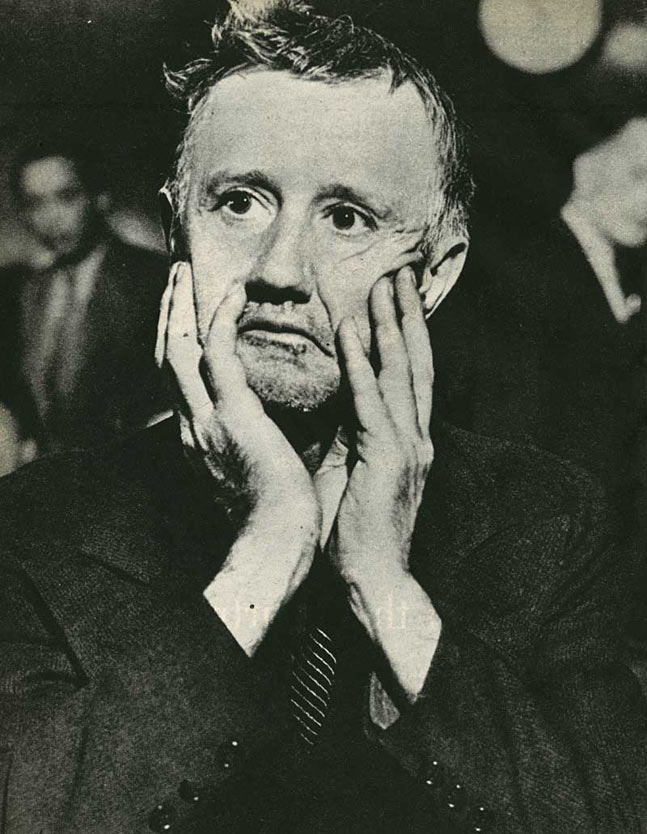
In April 1947, this photo led off a Coronet magazine spread on taces of people accused of murder and other crimes.. "For men who break or ignore the law, there is no hiding place, no turning back," according to the caption. "His hands eloquently expressing self-pity, this man confessed to killing two people. 'I wish I'd kept still,' he said."
Other photos and captions from the piece are posted here. H/t to John Stein.
vintage
Coronet magazine
crime
portrait
1947
courtroom
Feb 11, 2010

Twenty or so years ago, when our son Joe was in the first grade, he came home from school one day and announced that there was a boy in his class named Joshua who was his new best friend; Joe and Josh have been close friends ever since.
Josh met Keiko when she came to Tuscaloosa from Japan to go to school at the University of Alabama. They have been living in Japan for the past few years but may return to the United States next year; Josh hopes to start an MBA program.
children
portrait
Josh Jones
Keiko Jones
Feb 20, 2010
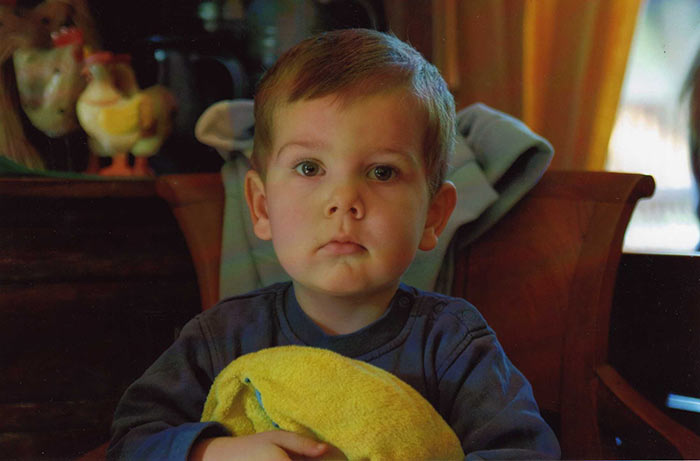
Ruben used to smile for the camera, but that was back when he was little and didn't know any better. Now that he's a big boy, he's studied his face in the mirror from a metaphysical perspective and divined the essence of his nature--to wit, the real Ruben, the Ruben reflected in the mirror, does not go through life wearing a smiley face. The real Ruben is a serious young man, and if you're pointing a camera in his direction, you'd best be prepared to capture the essence of Ruben, as we see here.
At least, this is how he explains it. It seems that the universe of three-year-olds is divided into two categories: clowns, and philosopher-princes. Ruben has taken his stand.
Germany
children
portrait
Ruben
(Image credit: via Tanja R. Baker)
Feb 15, 2011
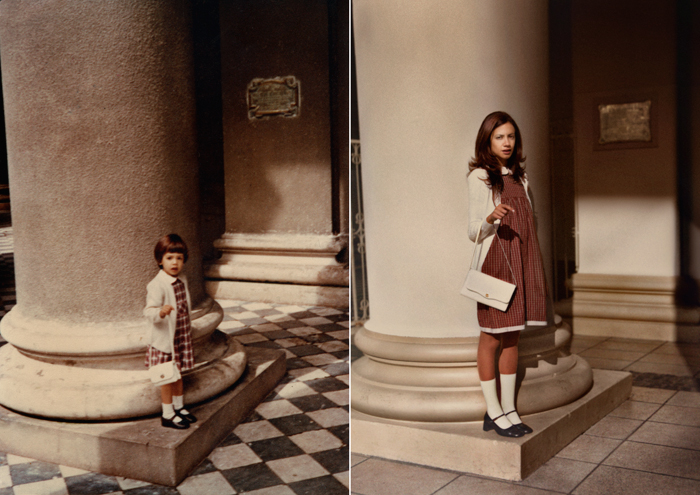 Here is Lali in Buenos Aires, the little girl in 1978 and the big girl thirty-two years later, in 2010. Argentinian photographer Irina Werning has published a series of such portraits, which she calls Back to the Future. The exercise requires a degree of attention to detail--re-creating the pose, facial expression, clothing,setting, lighting, and color tone of the original--that Werning says it taught her just how obsessive she is about her work.
Here is Lali in Buenos Aires, the little girl in 1978 and the big girl thirty-two years later, in 2010. Argentinian photographer Irina Werning has published a series of such portraits, which she calls Back to the Future. The exercise requires a degree of attention to detail--re-creating the pose, facial expression, clothing,setting, lighting, and color tone of the original--that Werning says it taught her just how obsessive she is about her work.
We'll look at another one tomorrow.
portrait
then and now
Lali
Buenos Aires
1978
(h/t: JJ)
(Image credit: Irina Werning)
Feb 16, 2011
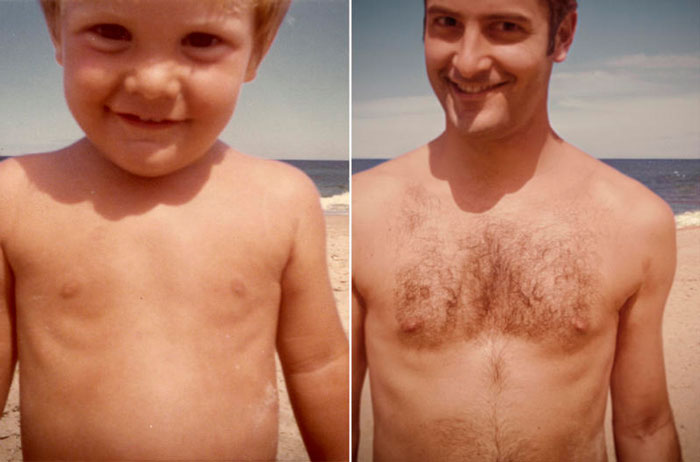 For a second look at photographer Irina Werning's Back to the Future portraits, we have Matias, on the beach in Uruguay, in 1977 and again thirty-three years later in 2010. The adult Matias is a reasonably attractive young man, but even though he's not wearing children's clothes and his pose here isn't flamboyantly juvenile, there's something almost creepy about a grownup presenting himself as an adorable little boy.
For a second look at photographer Irina Werning's Back to the Future portraits, we have Matias, on the beach in Uruguay, in 1977 and again thirty-three years later in 2010. The adult Matias is a reasonably attractive young man, but even though he's not wearing children's clothes and his pose here isn't flamboyantly juvenile, there's something almost creepy about a grownup presenting himself as an adorable little boy.
children
portrait
(h/t: JJ)
once and future
1977
Uruguay
Matias
(Image credit: Irina Werning)
Apr 16, 2011
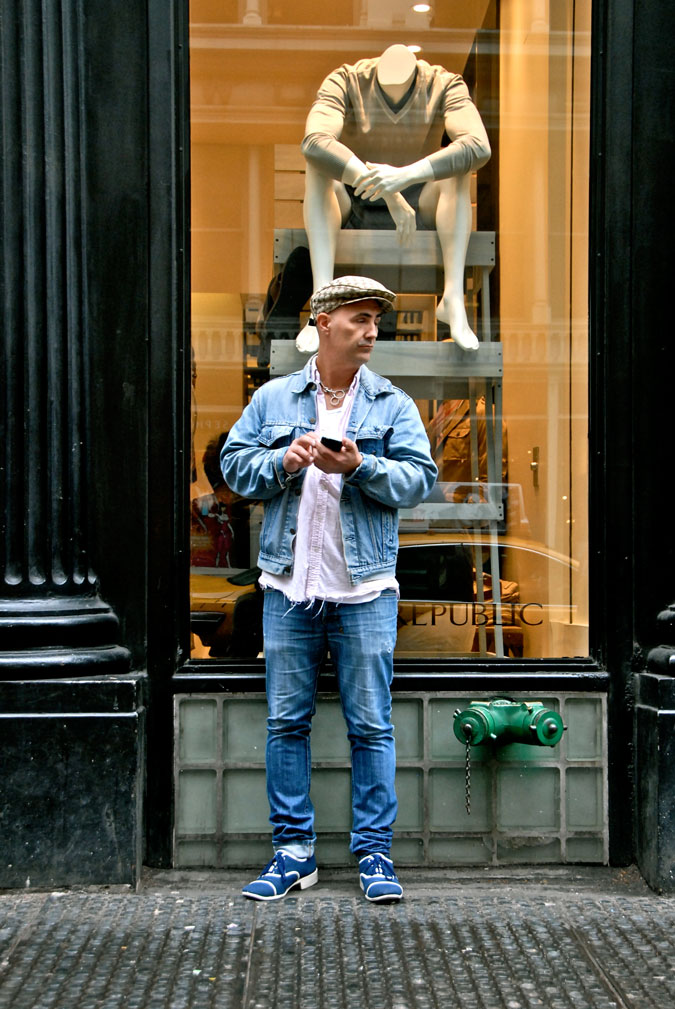
"I don't know," noted the photographer, who calls himself I Shot Baltimore. "Dude bought these shoes. I don't know wtf to say. Whatever."
cityscape
streetscape
portrait
fashion
(Image credit: I Shot Baltimore)
May 22, 2012
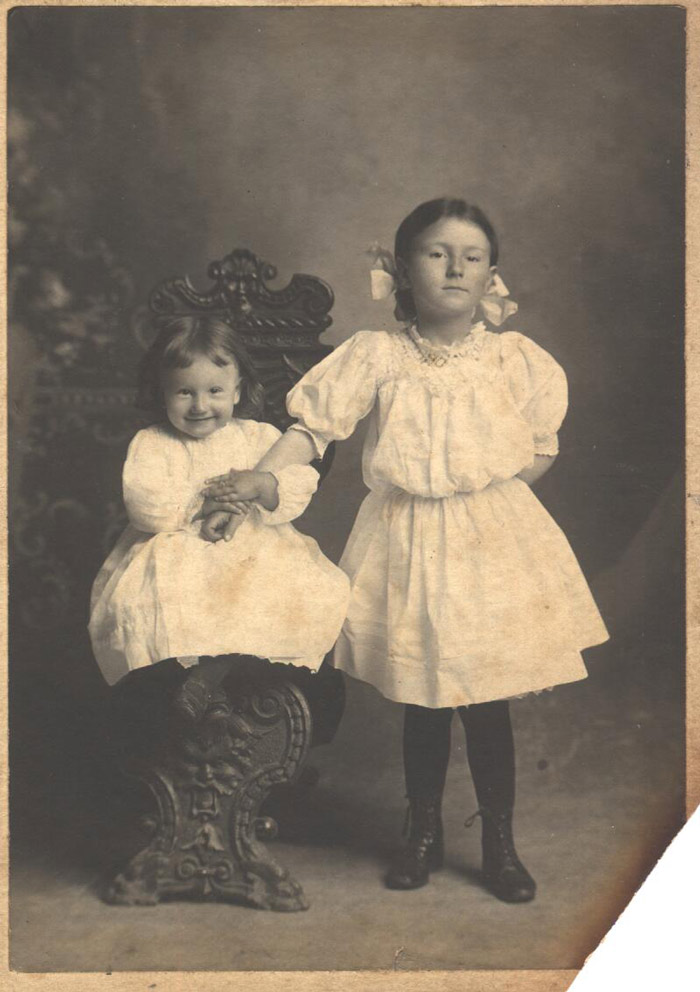 The little girl with the big grin, shown here in Smith County, Tennessee in 1906 or 1907, lived until 2011, when she was 105 years old. The grandchild who submitted the photo to Shorpy titled it "A Rare Smile."
The little girl with the big grin, shown here in Smith County, Tennessee in 1906 or 1907, lived until 2011, when she was 105 years old. The grandchild who submitted the photo to Shorpy titled it "A Rare Smile."
children
Tennessee
portrait
1905
Taylor Thomason
Smith County
longevity
sisters
Mar 6, 2013
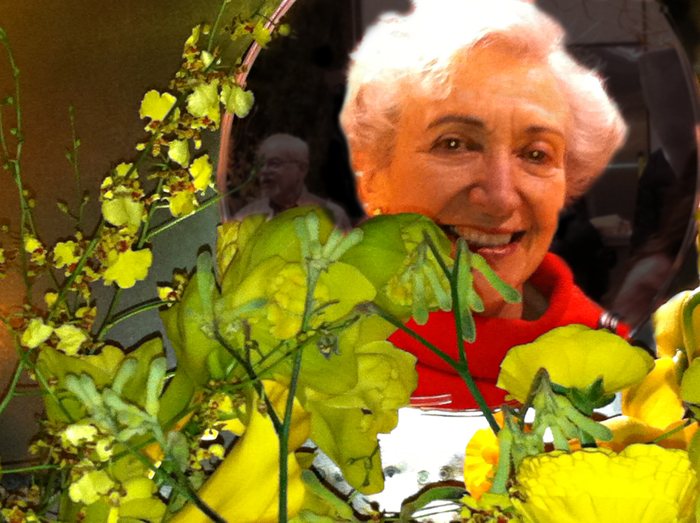 We all live in a yellow submarine, absolutely including my mother and yellow flowers upon yellow flowers. The theme of this year's flower show–Brilliant, as in British–was in the air everywhere, as the lads from Liverpool sang about Strawberry Fields and "Doing the garden, digging the weeds...." There was also a yellow submarine sort of thing out on the floor, pictured here.
We all live in a yellow submarine, absolutely including my mother and yellow flowers upon yellow flowers. The theme of this year's flower show–Brilliant, as in British–was in the air everywhere, as the lads from Liverpool sang about Strawberry Fields and "Doing the garden, digging the weeds...." There was also a yellow submarine sort of thing out on the floor, pictured here.
Most of the cultural references were literary, however, as opposed to musical. There were Peter Rabbit cottage gardens and Harry Potter owlish gardens, and allusion after allusion to Alice and the rabbit and the queen. There was a Jane Austen dooryard with a calling card left in the door; the name engraved on it in flowery script couldn't quite be made out from behind the picket fence that kept spectators out of the flower beds.
family
portrait
Philadelphia
Sandra Horowitz
Beatles
garden show
Jul 21, 2013
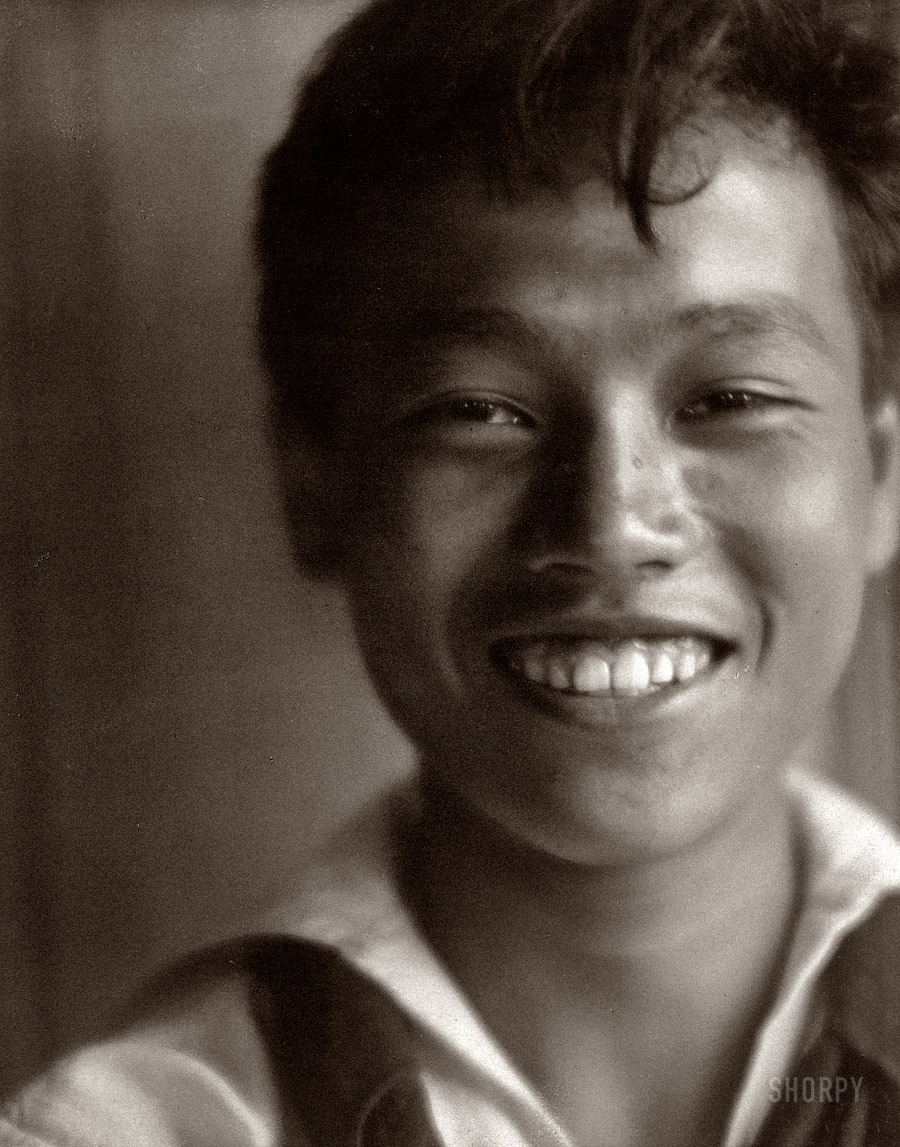 We know four small facts about the life of this boy, David Leung.
We know four small facts about the life of this boy, David Leung.
1. He was born in 1893 in San Francisco.
2. In 1911, he was photographed by eccentric New England art photographer F. Holland Day; like millions of American children of that era, young David wore a sailor suit for his portrait, but unlike all the millions of others, he actually smiled for the camera.
3. When he registered for the draft in World War I, David listed his residence as Manchester, New Hampshire, and wrote that he was of Mongolian descent.
4. In 1920, census-takers found David Leung living in Boston and working as a restaurant manager.
The photographer, F. Holland Day, was probably the leading American photographer of the early twentieth century and the first to pursue photography as an artistic endeavor. He was also fascinated by the immigrants then flooding American cities and spent much of his time with immigrant children, photographing them but also reading to them and tutoring them. He mentored a number of children in Boston, notably a Lebanese boy named Kahlil Gibran.
portrait
1911
child
David G. Leung
smile
(Image credit: Fred Holland Day via Shorpy)
Jul 27, 2013
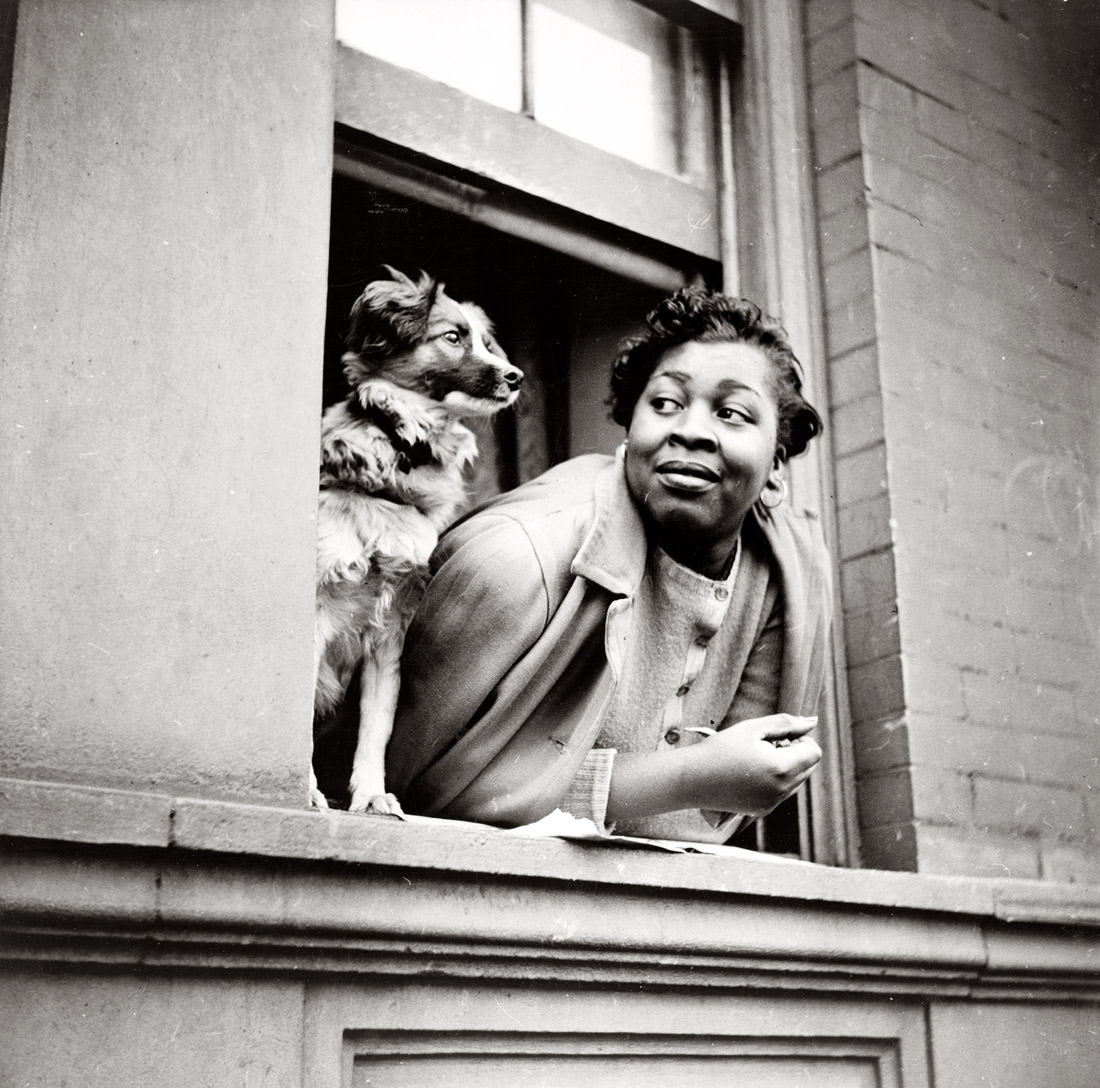 A woman and her dog, by Gordon Parks. New York, May 1943.
A woman and her dog, by Gordon Parks. New York, May 1943.
New York
dog
streetscape
portrait
window
Harlem
(Image credit: Gordon Parks via Shorpy)
Aug 3, 2013
 But what's that car doing on the boardwalk?
But what's that car doing on the boardwalk?
beach
streetscape
portrait
couple
hats
(Image credit: lbj1891)
Aug 5, 2013

A portrait shot and app-ified with a cellphone.
portrait
post-processing
iphone
(Image credit: Elaina Wilcox)
Sep 17, 2013
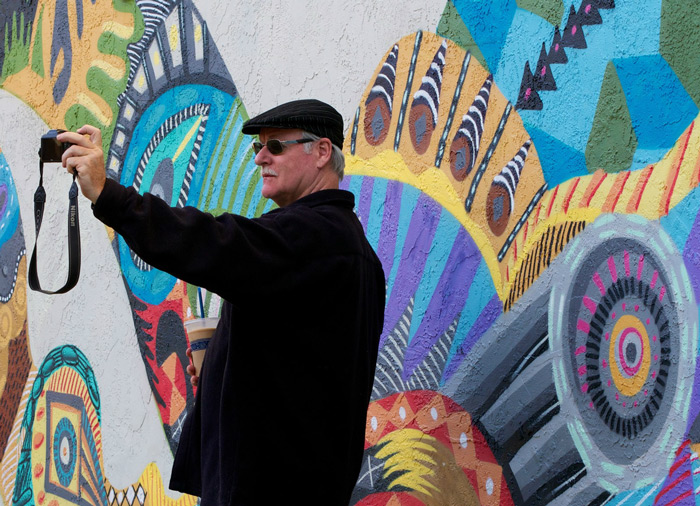
portrait
mural
camera
Mar 22, 2014
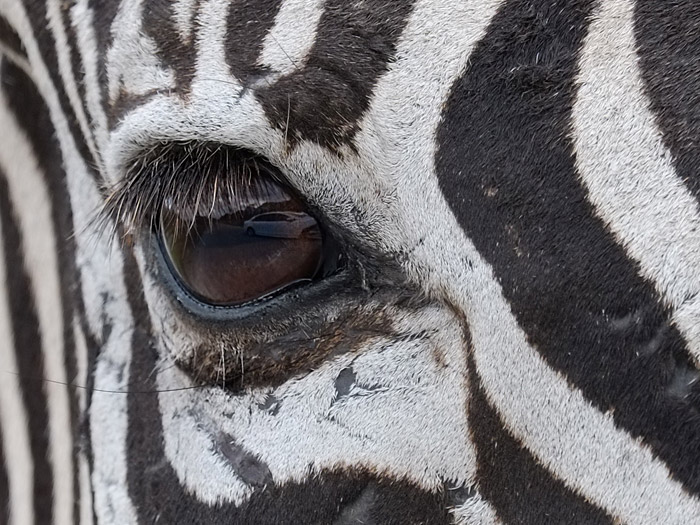 When the photographer snagged this zebra, he was shooting from the open window of the car that had caught the zebra's eye.
When the photographer snagged this zebra, he was shooting from the open window of the car that had caught the zebra's eye.
animal
portrait
reflection
zebra
close-up
eye
(Image credit: Eclectant)
Apr 8, 2014
 Lots of weather delays Sunday at the Birmingham airport.
Lots of weather delays Sunday at the Birmingham airport.
Alabama
portrait
airport
orange
sport
Birmingham
(Image credit: Little Fuji)
Aug 11, 2014

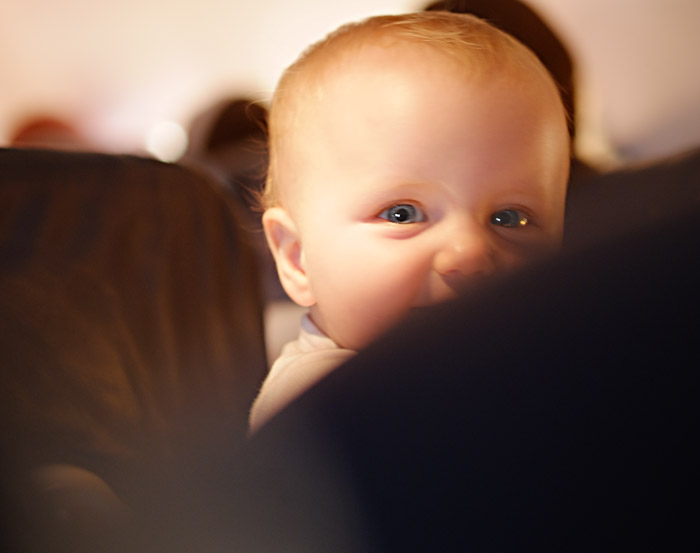

birdseye view
sunset
baby
portrait
plane
Mt. Rainier
(Image credit: Fuji T)
Jan 3, 2015
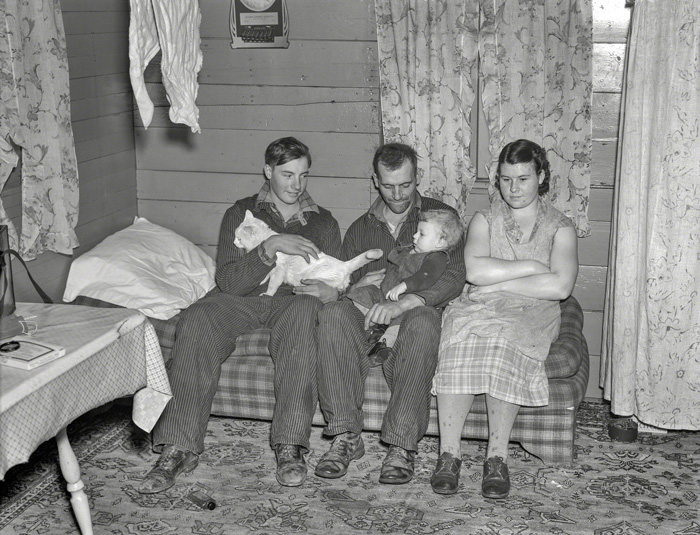 Lila Mae Helmke was 23 years old in 1936 when she appeared in this family portrait with her husband Bill, their son Allen, and her husband's brother, whose name was not recorded.
Lila Mae Helmke was 23 years old in 1936 when she appeared in this family portrait with her husband Bill, their son Allen, and her husband's brother, whose name was not recorded.
The photographer, Russell Lee, noted that the family all lived "in a one-room shack on a ninety-acre farm near Dickens, Iowa, owned by a lawyer."
We don't know how long Lila Mae and her family lived in that shack. But she and her husband had been born into farming families in Palo Alto County, Iowa, in the early years of the twentieth century, and they had been educated in country schools there. When they married in 1934, in the depths of the Depression, prospects for American farmers were nightmarish, even in places like northern Iowa, where the topsoil was three feet thick.
We have no record that the Helmkes ever owned any farmland. But they were farmers, and they stuck it out, trying to make a go of it somehow or other, for the first seventeen years of their married life, till Lila Mae was 38 and Bill was in his mid-forties.
In 1951, they gave it up and moved to town. They settled in Ruthven, Iowa, about seven miles east of the farmland near Dickens, where they had been born and raised.
By 1951, they had two nearly grown children, Allen and his younger brother Elton, known as Butch. Both boys would grow up, marry, and raise their own families in Ruthven, and they were still living there in January 2006, almost seventy years after the photo was taken, when their mother's death at the age of 92 was reported in the the Graettinger Times newspaper. Husband Bill–William August Helmke–had died in 1976, when he was 69.
Once the family had moved to town, Lila worked as a substitute cook at the Ruthven Community School and cleaned houses and the Ruthven State Bank.
She enjoyed sewing, gardening, and cooking, according to the obituary writer, and loved Jackie Gleason, Red Skelton, and The Price is Right.
The cat in the photo may have loomed large in her life: "She always had a family pet," wrote the obituary writer.
The smiling young man who is holding the cat in his lap, however, is lost to time. The photographer noted only that he was Bill Helmke's brother; we don't know his name, and Lila Mae's obituarist did not mention him at all, not in the list of survivors and not in the list of the predeceased. He looks of an age in 1936 to be called off to war just a few years after sitting for the family portrait, but even that detail is beyond our knowing.
family
baby
portrait
cat
Great Depression
Iowa
Lila Mae Helmke
farmers
(Image credit: Russell Lee via Shorpy)
Jan 25, 2015

From the Lockridge community near Durham, North Carolina, comes this photo and note from Carol Stack: "My first selfie, with birthday flowers."
This time of year also marks the birthday of our boy John, a.k.a. J.J. Good cheer to both, many happy returns, and let's hear it for one-eyed floral birthday selfies!
North Carolina
Lockridge
flowers
portrait
birthday
selfie
(Image credit: Carol Stack)
Feb 2, 2015
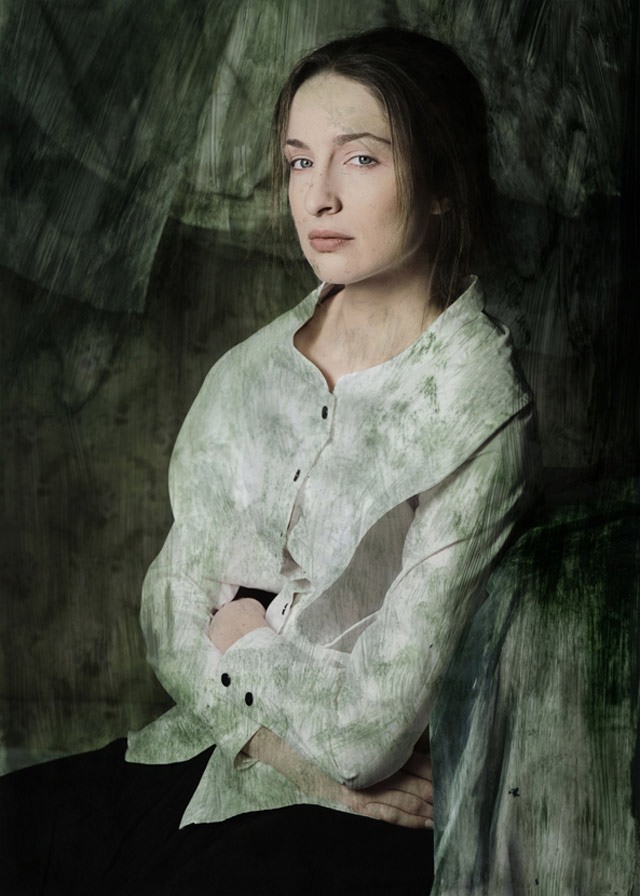
Portrait de la la Repasseuse, by Laura Corrado, from the 2015 Royal Photographic Society International Biennial.
Italy
portrait
work
(Image credit: Laura Corrado)
Apr 24, 2015
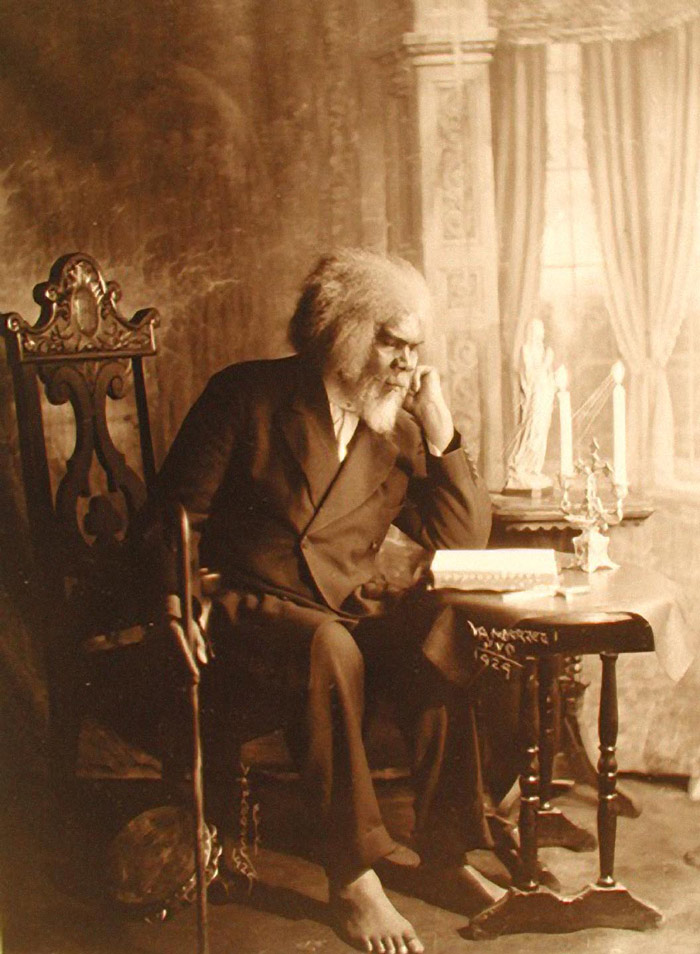 In this photograph, taken in 1929, the visions of two men come together.
In this photograph, taken in 1929, the visions of two men come together.
The subject of the portrait is Clayhorn Martin, a Harlem street preacher who had gone barefoot ever since the day in his youth when God told him to shed his shoes and walk on holy ground. Till the day he died, he walked the streets with his tambourine, shouting to the world that God dwells in every single person, not in church buildings or special dignitaries.
Martin was a homeless man, a neighborhood character. In this formal studio portrait, photographer James Van Der Zee focused not so much on his outward condition as on his internal seriousness and faith. In other words, the scene he set for his camera aimed to take Preacher Martin at his word, seeking to show the higher purpose within him.
Martin had been born a slave in Virginia in 1851; he died homeless on the street in 1937. Van Der Zee and other artists of the Harlem Renaissance raised money to give him a proper sendoff, a funeral attended by five hundred or more of his neighbors, his flock.
New York
portrait
Harlem
Elder Clayhorn Martin
homeless
1929
studio portrait
street preacher
(Image credit: James Van Der Zee)
Mar 7, 2016
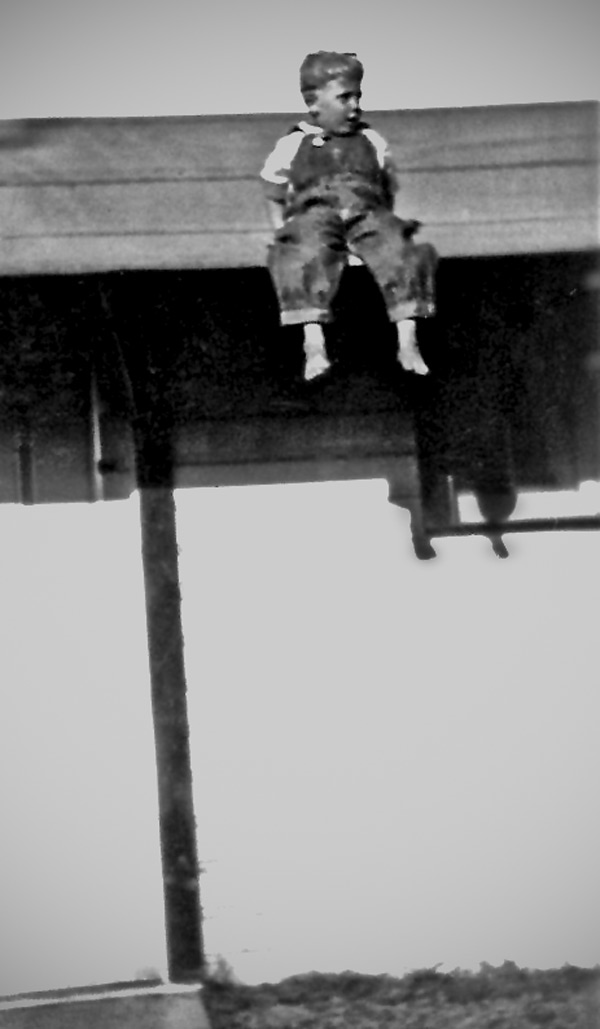
In 1930, when Allen Frederick Larsen of Muscatine, Iowa, was four years old, he sat for his portrait up on the rooftop, his bare feet dangling over the overhang. His own father took this photo, we're told, along with many others showing young Allen in precarious poses–often on rooftops, sometimes on railroad bridges. "It's a wonder he grew up to meet Mom," notes his daughter. "Grandfather took a lot of pictures."
house
portrait
1930
child
roofscape
Allen Frederick Larsen
(Image credit:Larsen via Shorpy)
Feb 8, 2017
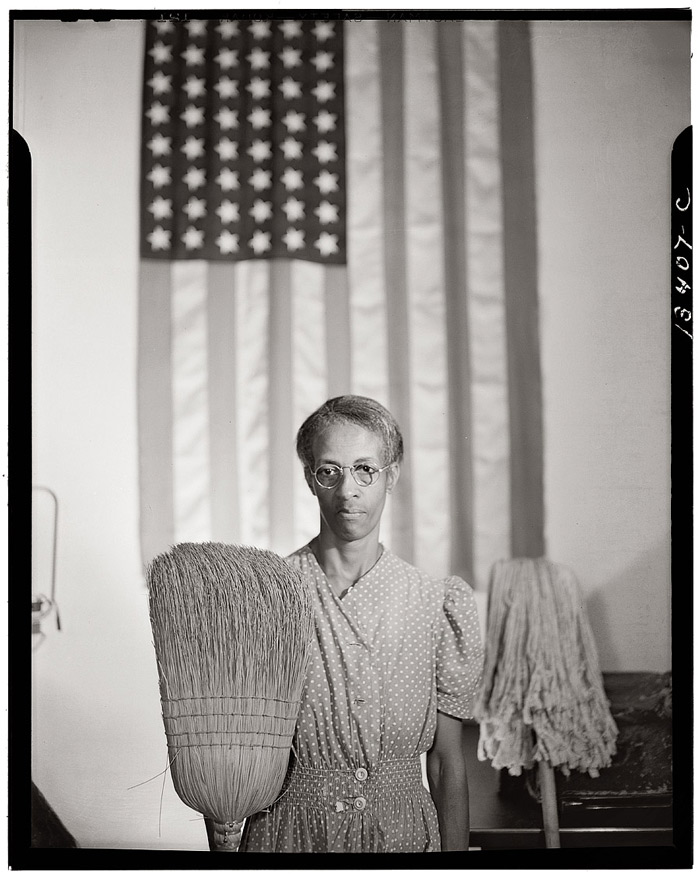 One of the first professional assignments undertaken by Gordon Parks was a 1942 photo essay featuring Mrs. Ella Watson, a "government charwoman" who cleaned federal office buildings at night, after the clerks went home, and supported her family, including an adopted daughter and three grandchildren, on her annual salary of $1,080.
One of the first professional assignments undertaken by Gordon Parks was a 1942 photo essay featuring Mrs. Ella Watson, a "government charwoman" who cleaned federal office buildings at night, after the clerks went home, and supported her family, including an adopted daughter and three grandchildren, on her annual salary of $1,080.
Parks's other photos of Mrs. Watson and her family, along with explanatory captions, can be viewed online, via the Library of Congress Farm Security Administration archive.
portrait
work
District of Columbia
1942
Ella Watson
(Image credit: Gordon Parks via Shorpy)



 Here is Lali in Buenos Aires, the little girl in 1978 and the big girl thirty-two years later, in 2010. Argentinian photographer Irina Werning has published a series of such portraits, which she calls Back to the Future. The exercise requires a degree of attention to detail--re-creating the pose, facial expression, clothing,setting, lighting, and color tone of the original--that Werning says it taught her just how obsessive she is about her work.
Here is Lali in Buenos Aires, the little girl in 1978 and the big girl thirty-two years later, in 2010. Argentinian photographer Irina Werning has published a series of such portraits, which she calls Back to the Future. The exercise requires a degree of attention to detail--re-creating the pose, facial expression, clothing,setting, lighting, and color tone of the original--that Werning says it taught her just how obsessive she is about her work. For a second look at photographer Irina Werning's Back to the Future portraits, we have Matias, on the beach in Uruguay, in 1977 and again thirty-three years later in 2010. The adult Matias is a reasonably attractive young man, but even though he's not wearing children's clothes and his pose here isn't flamboyantly juvenile, there's something almost creepy about a grownup presenting himself as an adorable little boy.
For a second look at photographer Irina Werning's Back to the Future portraits, we have Matias, on the beach in Uruguay, in 1977 and again thirty-three years later in 2010. The adult Matias is a reasonably attractive young man, but even though he's not wearing children's clothes and his pose here isn't flamboyantly juvenile, there's something almost creepy about a grownup presenting himself as an adorable little boy.
 The little girl with the big grin, shown here in Smith County, Tennessee in 1906 or 1907, lived until 2011, when she was 105 years old. The grandchild who submitted the photo to
The little girl with the big grin, shown here in Smith County, Tennessee in 1906 or 1907, lived until 2011, when she was 105 years old. The grandchild who submitted the photo to 















